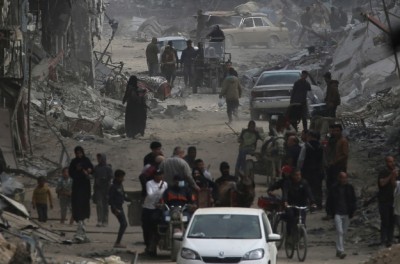The AFP and Australian Border Force will be on alert for human trafficking following the reopening of the international border to vaccinated tourists and visa holders earlier this week.
The agencies are urging travellers and workers to learn the signs of suspicious activity at airports and know how to report them to authorities.
Closed borders during the COVID-19 pandemic have curtailed crimes that are enabled by travelling – such as drug couriers, money mules and international forced marriages – however investigators expect criminals to exploit increasing passenger numbers at airports.
AFP Commander Human Exploitation Hilda Sirec said investigators expected reports of all forms of human trafficking, which is also called modern slavery, would increase from Monday.
“Human trafficking is happening here in Australia and it is up to all of us to work together to protect people who are vulnerable to these exploitative crime types,” Commander Sirec said.
“People may be taken overseas for a forced marriage, tricked into coming to Australia and forced into servitude or be promised to have their visa sponsored through the offer of a good job but in reality forced to work in squalid conditions for low wages.”
“This is a reminder that forcing someone to leave or enter Australia using coercion, threats or deception is an offence under our laws, and Commonwealth human trafficking offences and penalties apply.
“As international traveller numbers increase it is important for all of us to be aware of the warning signs and indicators of human trafficking. If you or someone you know could be a victim of this crime type, please report it by calling 131 AFP (237).”
“The Australian Federal Police have specialist trained investigators positioned around the country, who will compassionately and sensitively help you.”
“Some of the signs that may indicate something is wrong include a person who appears reluctant to travel, or their movements appear to be controlled by another person; also they may not have access to or control of their own passport or identification.”
The AFP has received 189 reports of human trafficking between 1 July 2021 to 9 February 2022, which is at a slightly increase rate to the 2020-21 financial year when 224 reports were received for the full year.
Forced marriage is the most common form of human trafficking and slavery offence reported to the AFP, making up 47 of the 189 reports in the current financial year.
Nearly two thirds of reports of forced marriage has historically involved victims younger than 18 and 70 per cent related to offshore marriages.
Despite the pandemic impacting borders, the AFP has continued to investigate a large number of human trafficking cases, including cases which have required the repatriation of the victims to Australia after being trafficked.
To do so, the AFP engages with other Government agencies and Non-Government Organisations to prioritise the safety of the victim and their return to Australia.
The AFP has also continued to intervene during the pandemic in situations where a person has been at risk of being trafficked outside of Australia for the purpose of forced marriage.
This intervention will often involve relocation of the person at risk to a safe place and the provision of practical and therapeutic support through the governments Support for Trafficked People Program (STPP).
In the 2020-21 financial year, the AFP removed 57 people from harm in Australia and referred them to the STPP.
Forced marriage crimes often affect young women and men and causes great distress and harm to those involved. Victims often face personal risk when they come forward to police.
The AFP is generally unable to provide specific details on investigations where police have intervened, in order to ensure the privacy and safety of persons at risk.
But two recent cases highlight the dangers faced by victims and the work done by Australian agencies, including the AFP, to keep them safe.
In 2018, two Australian-born girls travelled with their family to a Middle Eastern country where they were advised that plan had been made for both of them to marry.
The girls fled and took refuge with an NGO. Australian consular officials made arrangements for the girls’ safe return to Australia through a third country.
They returned safely to Australia and have been provided with ongoing support through the STPP.
Also in 2018, a school in Australia identified a female high school student who was at risk of being removed from Australia for a forced marriage in the country that she was descended from.
The marriage had been arranged by family members and the girl was identified as being vulnerable to coercion and exploitation. The AFP referred her to the STPP and has continued to monitor her welfare including activating border alerts to prevent her removal overseas.
The alerts have prevented a further attempt to take her overseas for marriage, which included advanced preparations for the ceremony.
Like many in this position, the young woman did not want to assist with an investigation however, the AFP, in collaboration with its partners, continue to monitor her welfare and safety.
People who have been trafficked are often victims of the most heinous of crimes including physical and sexual assaults; deprivation of food or a breach of their basic human rights because their freedom is controlled by others.
According to a February 2019 report from the Australian Institute of Criminology, there are approximately four undetected victims for every victim detected.
While the AFP and ABF are on the frontline against this crime type they want to remind the public that everyone has a role to play in stopping it.







